A trail of blood and bigotry
Rod Liddle
SACRED CAUSES: RELIGION AND POLITICS FROM THE EUROPEAN DICTATORS TO AL QAEDA by Michael Burleigh HarperPress, £25, pp. 557, ISBN 0007195745 ✆ £20 (plus £2.45 p&p) 0870 429 6655 This is an even better book than the author’s erudite, dense and sprawling triumph of last year, Earthly Powers. With Sacred Causes, we are now in the present day, near enough — and that terrible, human, susceptibility to secular or religious ideologies possessed of unbending certitude, which in a way is Burleigh’s theme, should tweak the interest of all those who worry a little about the rigorous proclivities of Islam; just as it should interest those who are dubious of the fashionable thesis that, were we to smite God fatally once and for all, our troubles would be over. For despite the commendable industry of Osama bin Laden and his followers, Al Qaeda lags woefully behind those rational atheists Stalin and Hitler in the premiership league table of murder and genocide and, particularly in the murder of Jews, of course, which must gall Al Qaeda no end.
So, Sacred Causes is, by its subject matter, a more accessible work. But it also benefits from a continual drip feed of very dry and very black humour; few of our conservative historians are minded to provoke belly-laughs in their readership, but here one at least chuckles, uncomfortably, on almost every page.
There is still Burleigh’s great gift, the mark of the very best of historians, to wring meaning and significance from those most arcane footnotes of history, stuff which others might designate mere ephemera. He is terrific, and very funny, on the profusion of proto-hippy, new age gurus and charlatans which emerged, barking at the moon, from the philosophical and economic chaos of post-Versailles Germany. I had not known about Ludwig Christian Haeusser, with his addiction to ‘cunnilingus and sado-masochism’, his occasional delight in vomiting over his adoring audiences and his maniacal howling: ‘Bloodhound! Blood-storm! Bloodblood-blood-blood shall flow. Blood must flow!’ Burleigh calls him Hitler’s holy fool and I was absolutely delighted to make his acquaintance and be reminded that Hitler was not, simply, a terrible anomaly.
He is better still on the emergence of the Soviet Union and cites Bertrand Russell’s early disillusion with Bolshevism, from a visit to Russia in 1920: ‘I felt that everything I valued in human life was being destroyed in the interests of a glib and narrow philosophy.’ Later, Burleigh examines the desperate attempts of that overrated Soviet poet and propagandist Alexander Blok to somehow imbue that same glib and narrow philosophy with religious significance, in typically leaden verse, unworthy of the description ‘Symbolist’: ‘For a time Blok made a pittance from reciting his poems to large audiences before cold and hunger killed him when he had no more books to sell and no more furniture to chop up for firewood.’ And yet the stupidity, incompetence and viciousness of Soviet communism did not deter Western liberal intellectuals from being seduced, or halfseduced, by it for the next 70 miserable and confusing years.
When the collapse of the socialist bloc came it was partly — with exquisite irony — through the weight of communism’s own internal contradictions; but also, as Burleigh perhaps too strongly emphasises, through the longevity and eventual resurgence of Christian belief — a competing ideology which was both more compelling and more tolerant than that to be laid at the respective doors of Karl Marx and Lenin. The first government of the newly liberated GDR contained four Protestant pastors; there were 14 in the newly elected parliament.
And now, as Burleigh concludes, we are faced with a similarly implacable and violent totalitarian philosophy and an identical passivity or tacit connivance on the part of liberal intellectuals. ‘Islamic terrorist atrocities are a fact,’ Burleigh writes, ‘and not a figment infiltrated into our anxious imaginations by our rulers, a familiar trope of the superficially clever who regarded the Cold War in similarly domestic, instrumental terms. [Theo] Van Gogh [the Dutch film-maker executed by a Muslim fanatic] was cut to pieces not by a phantom, but by a real man, who is currently sitting in a Dutch prison.’ Burleigh continues, ‘Our murderers are inspired by hatreds of the Occident that owe as much to the history of Western self-repudiation as to resentment or puritanical and politically radicalised versions of Islam.’ History is rarely rendered in such thrilling breadth, with such wit or with such terrible topicality.



































































































 Previous page
Previous page